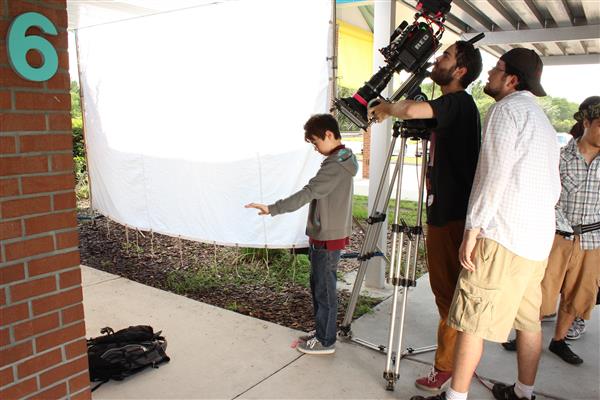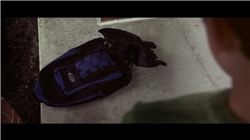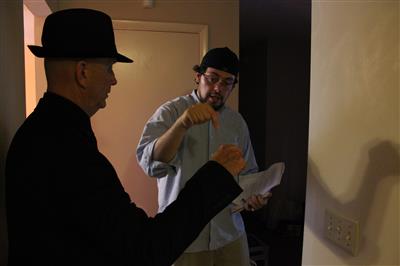

The Black Bird, by Jared Cooley
Murfreesboro Pulse: How would you describe your film?
Cooley: A supernatural mystery about a boy facing a larger than life situation. Not having anyone to turn to, he must face a danger head-on while discovering that there’s something more to himself then he knew. The message of the short is about stepping outside one’s comfort zone, facing fears, and believing that we have something great inside of all of us.
What challenges did you/your crew encounter while making the movie?
Our first day of shooting we had our animal for six hours and that’s all we could afford to do since we were using David Sousa. He was one of the animal trainers from the Harry Potter films, The Matrix, and Thor. The original scene took place outside on a playground, but when a storm came in we had to rethink the scene. We were able to rewrite the scene so that we could shoot in the weather. We got everything we needed from the bird and then some.
How long have you been working in motion pictures?
I’ve been working in the film industry since 2011. But I’ve been playing with video cameras all my life.
In the process of film-making, how much of the creativity is found in production? How much improvisation do you find on set?
It really depends on the project and story. This film I had conceived every shot, every angle from the beginning and knew how I was going to cut it together with my editor. We did have to rewrite a location because of weather, but the story stayed almost exactly the same. I shot a second short film together with this one and we intentionally left room to improvise. It was handheld and we wanted to catch a lot of the performances as they unfolded naturally. There is always moments where things might need to be changed or rewritten complete based off what you have already gotten on film. It’s just the nature of filmmaking.
What attracted you to the medium of film?
I’ve always loved movies. Even more so than the people around me growing up. Almost every boy goes through a stage of playing with action figures and I remember crafting stories that were more in-depth than most of my friends cared to go. But I didn’t realize I wanted to make films until I was in high school doing broadcasting classes. I started with editing and soon I found myself creating different projects just so I could edit them. I got a lot of reactions from my packages on football or other sporting events. I had always had thoughts of being in front of the camera, but now I was realizing I really enjoyed crafting visual stories. I enjoyed invoking emotions in people through visual storytelling. That’s what I enjoy when a film can “make” me feel something. Whether it’s happy or sad or whatever, if a film that I know is fake and full or recognizable people can transcend that dilemma and almost force feelings that sometimes I’ve never felt before I am gratified and thrilled at the experience. That’s what I want to do.
What would you say of the place motion pictures have in our culture?
Well they can sway broad audiences to look at situations differently. I think it shapes our minds to be concerned or content about the world and society. At the same time I don’t think that films can be blamed for any actions of people who have done horrible things. It has an influence but people in the end are responsible for their actions. On a different note, there are many classic and wholesome movies that have given joy to many of us in our childhood and adult lives. Often when we feel a sad or happy we look for films to support or combat those emotions. I think the escapism is very therapeutic.
What makes a great movie? What elements do you think an audience should look to appreciate?
I think in a general sense the story. If it has more than one plot, more than one-dimensional characters, and there’s a lesson to be learned. Now personally I find myself drawn to unique visual style, deep and well-realized characters, and like I said early emotional stories. It doesn’t matter which emotion just as long as I feel it, feel that I believe it and forget for a few minutes that this is all made up. I think an audience should always find a personal piece of themselves in the films they watch no matter the genre.

If you could change one thing about the process, what would it be?
The difficulties in funding. Not that every movie needs unlimited resources, but that there was a more accessible way to connect filmmakers with those who are willing to fund their art.
How did you learn your craft?
I moved to Florida to take film courses at Valencia College. I had heard about their advanced film program that Steven Spielberg has endorsed in the past. They take their students and put them on independent productions as interns working with the active professionals in the area doing mostly entry level jobs. Everyone who has a good attitude and work ethic is working in the film industry from my year, I would say about 70% success rate. They currently approved the building of a $13-million facility to be built by 2016. I owe a lot to that school and the head of the film department, Ralph Clemente.
What themes do you like to explore in film?
Well I’m a huge mystery and thriller buff, but I truly love films in every genre and would like to explore them all. Mystery is a huge part of every film if you think about it, we all go in wondering where is this story going to take me and it’s a let down when we can figure it out early on or if the trailers give everything away.
What inspires/influences you?
Creativity. The problem with the industry today is there’s a lack of originality. Everything is being redone. I look to the ’80s for inspiration. Even though there were some odd movies back then, there was a lot of thinking outside the box. I also used to hate television, nothing felt as polished as film. But then I happened upon Lost and that got me opened up to the possibilities of the quality that can exist on there, the first season of Dexter, Game of Thrones and Breaking Bad to name a few. I tend to think that I love artistic and meaningful movies the most, but that said my favorite movie is Die Hard. I believe one can appreciate all aspects of every genre.
Are there any particular genres you favor over others?
The ones I favor the most would be mystery, thriller and drama. But I can never say no to a good action/adventure movie.
In terms of motion picture production, what would you like to see from the state of Tennessee? What advantages does the state currently have, and how do you think it could improve?
I would like to see incentives. This is my home and I would like to work as much as possible here in the future, but so far all my work has come from elsewhere. The advantage of this state is that, more so than any other East coast state, there is a very diverse landscape with a mild climate. Throughout my youth I could see countless stories unfolding within this amazing country side. I plan to utilize that in the future.
On what projects are you currently working?
My next short film project has a first draft script, some crew, and locations coming together I planned to shoot at the end of summer or early fall. I also just got hired as a script supervisor on a feature film at the end of April for the next four months.
What advice do you have to aspiring filmmakers?
Go and do. Don’t wait, don’t stand idly by. You are the only one that limits yourself. Go work on films and if you are wanting to make your own, work on films until you can. Find people you want to work with and make it happen. But the best place to learn is on set. No classroom or lab can substitute that.
What do you see for the future of storytelling through motion pictures?
The sky’s the limit. I think we will begin to see a lot of foreign storytelling coming in even more so then they are already. Even though digital is taking over, I believe that film is here to stay, though in a much smaller capacity. I worry about the theater system because of the great experience people will miss out on when it leaves. I truly love that experience. But the evolution of the industry is so fast that there are great possibilities for future filmmakers. It’s exciting.













